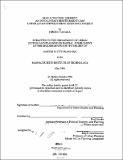| dc.contributor.advisor | Paul Smoke. | en_US |
| dc.contributor.author | Tanaka, Hiroko | en_US |
| dc.date.accessioned | 2012-04-26T18:26:27Z | |
| dc.date.available | 2012-04-26T18:26:27Z | |
| dc.date.copyright | 1994 | en_US |
| dc.date.issued | 1994 | en_US |
| dc.identifier.uri | http://hdl.handle.net/1721.1/70244 | |
| dc.description | Thesis (M.C.P.)--Massachusetts Institute of Technology, Dept. of Urban Studies and Planning, 1994. | en_US |
| dc.description | Includes bibliographical references (p. 86-90). | en_US |
| dc.description.statementofresponsibility | by Hiroko Tanaka. | en_US |
| dc.format.extent | 94 p. | en_US |
| dc.language.iso | eng | en_US |
| dc.publisher | Massachusetts Institute of Technology | en_US |
| dc.rights | M.I.T. theses are protected by
copyright. They may be viewed from this source for any purpose, but
reproduction or distribution in any format is prohibited without written
permission. See provided URL for inquiries about permission. | en_US |
| dc.rights.uri | http://dspace.mit.edu/handle/1721.1/7582 | en_US |
| dc.subject | Urban Studies and Planning | en_US |
| dc.title | How is "success" defined? : An involuntary resettlement case under Japan's development assistance project | en_US |
| dc.type | Thesis | en_US |
| dc.description.degree | M.C.P. | en_US |
| dc.contributor.department | Massachusetts Institute of Technology. Department of Urban Studies and Planning | |
| dc.identifier.oclc | 31759177 | en_US |
